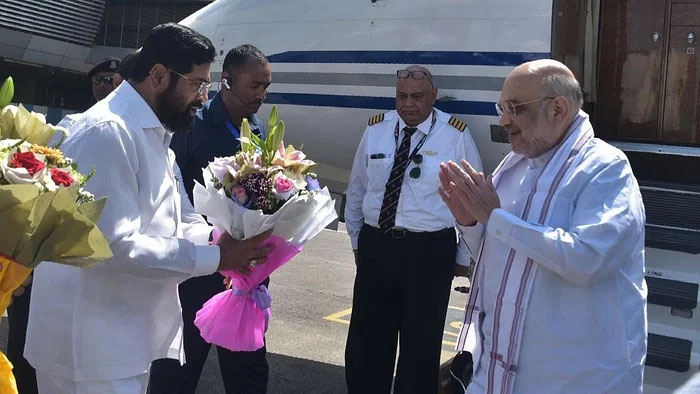Maharashtra
Mumbai: Amid speculations of post-swap, CM Shinde, Amit Shah hold closed-door meet during his visit to city

Mumbai: Torn asunder by the intense speculation in political circles over his fate, Maharashtra Chief Minister Eknath Shinde is believed to have confided in Union Home Minister Amit Shah, during the latter’s visit to the city on Sunday, according to reliable sources. Shah reportedly assured him about the stability of his government, sources said.
After participating in a public programme to listen to Prime Minister Narendra Modi’s 100th ‘Mann Ki Baat’ episode at the M L Dahanukar College of Commerce, Vile Parle, CM Shinde and deputy CM Devendra Fadnavis had a closed-door meeting with Shah at the residence of local MLA Parag Alawani, nearby.
Shinde has been restive over the past few weeks because of the speculation on the possibility of a change of leadership in Maharashtra after the SC verdict on the disqualification of MLAs belonging to his camp.
He is reported to have raised the issue at the meeting and was assured that there was no threat to the stability of his government.
The political world awaits SC decision
There has been immense conjecturing on the political situation in the state after the SC verdict, which is expected to be delivered within a week. The possibility of the MLAs from the Shinde group getting disqualified and a group from the NCP, along with senior leader Ajit Pawar, joining hands with the BJP is being discussed. Further, it is being surmised that the BJP is unhappy with Shinde’s performance. Shah’s two visits to the state in as many weeks have only served to further stoke the theory. In this backdrop, the closed-door meeting at Alwani’s residence assumes importance.
Shah was in town on April 15, having long discussions with his party leaders as well as with Shinde and Fadnavis. It is widely believed that issues like the situation after the SC verdict and cabinet expansion etc. were discussed at the meeting. However, Shinde faced a lot of flak for the gross mismanagement of the death of 14 people by heatstroke at the Kharghar rally addressed by Shah. The opposition went ballistic, demanding the resignation of Shinde.
Shinde facing flak alone on both Kharghar tragedy and Barsu issue
The CM was particularly unhappy because he felt alienated through the entire episode, with the BJP maintaining a studied silence. The Kharghar episode was immediately followed by the agitation at Barsu village in Ratnagiri district against the proposed refinery. Once again, Shinde was under attack again and seemed to be fighting alone. He is learnt to have shared his apprehensions over the BJP’s role in both the episodes with the Shah at the meeting.
All said and done, though it is more than eight months since the government has come to power, Shinde doesn’t seem to have gained administrative traction. Though this could be primarily due to the pending cases in the SC, Shinde’s style of working too is being blamed for it.
Crime
Mumbai Crime: 26-Year-Old Man Arrested For Sexually Assaulting 10-Yr-Old Boy In Lower Parel Railway Yard

Mumbai: The Churchgate Police have arrested a 26-year-old man under the POCSO Act (Protection of Children from Sexual Offences) for allegedly sexually assaulting a 10-year-old boy in the Lower Parel railway yard area on January 31. The accused is currently in police custody.
According to the Government Railway Police (GRP), the incident occurred on January 31 between 9:30 AM and 11:00 AM. The accused, a native of Madhya Pradesh, is unemployed and lives on footpaths in Mumbai. He has a criminal history, with several cases of theft registered against him at various police stations.
The investigation revealed that the accused lured the boy by promising him Rs.10,000 for watching a bag. He told him that his bag was stuck in the local train. He took the boy from Churchgate on a local train and alighted at Lower Parel. There, he led the boy inside the yard to a parked train and sexually assaulted him before fleeing.
The victim was found crying by the Mumbai Central Railway Police, who then traced his mother. The boy’s family resides on a railway platform. A case was registered and transferred to the Churchgate Railway Police Station.
Using CCTV footage and human intelligence, the police arrested the accused. The Churchgate Railway Police have registered a POCSO case against him. The boy is in the 3rd standard.
Crime
Mumbai Police’s Anti-Narcotics Team Attacked By Suspected Drug Traffickers In Navi Mumbai; Several Injured

Navi Mumbai: In a shocking incident, the anti-narcotics team of the Mumbai Police was attacked by suspected drug traffickers during an operation in the Ulva area of Navi Mumbai last week. The incident occurred when the team conducted a raid in the Ulva locality while tracking suspects linked to a drug trafficking case who were located near Shagun Chowk.
When officers attempted to arrest them, the accused allegedly launched a violent attack on the police team using sharp weapons, including choppers, swords, hockey sticks and a village axe. In the attack, Assistant Police Inspector Kiran Mandhare of RCF Police Station was injured in the attack. Other police personnel, including Firoz Siddiqui, Ahmed Raza Qureshi and Atul Jaisawal, also sustained injuries and are currently undergoing treatment.
Following the attack, the senior police inspector at the Ulva Police station immediately sent a team of police for help. Moreover, a case has also been registered against all eight accused.
The report also stated that the Mumbai Police team did not seek help from the local police station before conducting the raid and had not informed the Navi Mumbai Police in advance about the operation.
Earlier In January 2026, three men were taken into custody for allegedly arguing with and assaulting traffic police personnel during a vehicle-checking drive at a naka bandi in Panvel on New Year’s Eve, leaving a traffic constable injured.
The incident took place around 2.30 am on December 31 at Shivshambho Naka, where traffic police had intensified checks as part of security arrangements for New Year celebrations.
Maharashtra
BMC Announces Strict Sanitation Fines In Mumbai: ₹250 Fine For Spitting, ₹500 For Littering & ₹25,000 For Transporting Garbage Without License

The Mumbai Municipal Corporation has stepped up efforts to improve cleanliness and sanitation across the city by intensifying awareness around solid waste management rules and imposing penalties for violations. The move is part of a broader push to ensure cleaner public spaces and better waste handling practices across residential, commercial and public areas.
The civic body is creating awareness about regulations related to waste generators, establishments, waste service providers and solid waste processing. These rules govern the storage, segregation, transportation, and disposal of waste. Officials have made it clear that strict penalty action will be taken against citizens and establishments that fail to comply.
Under the revised enforcement, fines have been specified for common violations. A penalty of Rs 250 will be imposed for spitting in public places. Dumping garbage will attract a fine of Rs 500, while failure to segregate wet and dry waste will result in a fine of Rs 200. Transporting garbage without a valid licence will invite a penalty of Rs 25,000.
As per the directions of Municipal Commissioner Bhushan Gagrani, regular action is being taken to maintain cleanliness within municipal limits. Additional Municipal Commissioner City Ashwini Joshi, under the guidance of Deputy Commissioner Solid Waste Management Kiran Dighavkar, said continuous efforts are being made to strengthen solid waste management systems in the city.
Special cleanliness drives and activities are also being organised from time to time to reinforce these measures.
The bylaws will apply to all waste generators and to public and private places. This includes residential buildings, business and commercial establishments, professional and industrial premises, government and semi-government offices, educational institutions, religious places, recreational spaces and all other areas of public use.
The focus of the rules is on preventing littering and nuisance, ensuring clean premises and mandatory segregation of solid waste at source.
The regulations lay down detailed responsibilities regarding storage and collection of municipal solid waste, duties of producers, municipal authorities, representatives and contractors, and the handling of material recovery facilities. They also cover biomedical waste, e-waste, construction and demolition debris and plastic waste.
Additional fines have been announced for specific offences. Throwing garbage on roads, footpaths, gardens or public places will attract a fine of Rs 500. Bathing in public places will result in a fine of Rs 300. Urinating or defecating in public places will attract a fine of Rs 500 each. Feeding animals or birds in public spaces will also invite a fine of Rs 500.
Failure to keep courtyards or premises clean can result in fines ranging from Rs 500 to Rs 1,500.
Dr Ashwini Joshi appealed to citizens and establishments to strictly follow the bylaws and cooperate with the municipal corporation in keeping Mumbai cleaner and more beautiful.
-

 Crime3 years ago
Crime3 years agoClass 10 student jumps to death in Jaipur
-

 Maharashtra1 year ago
Maharashtra1 year agoMumbai Local Train Update: Central Railway’s New Timetable Comes Into Effect; Check Full List Of Revised Timings & Stations
-

 Maharashtra1 year ago
Maharashtra1 year agoMumbai To Go Toll-Free Tonight! Maharashtra Govt Announces Complete Toll Waiver For Light Motor Vehicles At All 5 Entry Points Of City
-

 Maharashtra1 year ago
Maharashtra1 year agoFalse photo of Imtiaz Jaleel’s rally, exposing the fooling conspiracy
-

 National News1 year ago
National News1 year agoMinistry of Railways rolls out Special Drive 4.0 with focus on digitisation, cleanliness, inclusiveness and grievance redressal
-

 Maharashtra1 year ago
Maharashtra1 year agoMaharashtra Elections 2024: Mumbai Metro & BEST Services Extended Till Midnight On Voting Day
-

 National News1 year ago
National News1 year agoJ&K: 4 Jawans Killed, 28 Injured After Bus Carrying BSF Personnel For Poll Duty Falls Into Gorge In Budgam; Terrifying Visuals Surface
-

 Crime1 year ago
Crime1 year agoBaba Siddique Murder: Mumbai Police Unable To Get Lawrence Bishnoi Custody Due To Home Ministry Order, Says Report
















